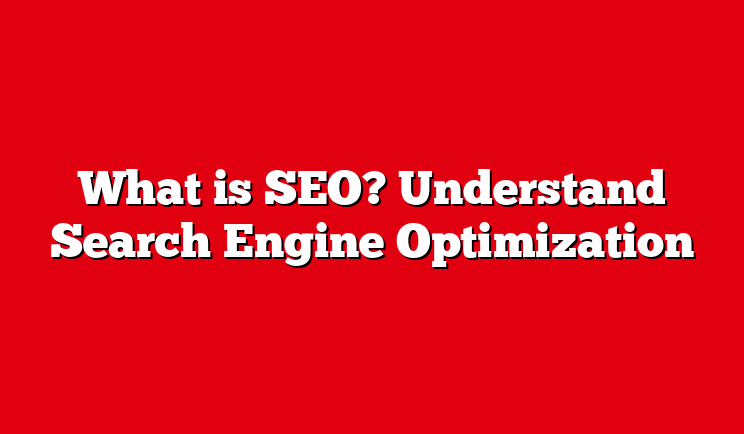What are Keywords in SEO and Why Do They Matter
Keywords are crucial for SEO, guiding users to relevant content. They are the words or phrases people type into search engines, vital for businesses aiming to boost online visibility. Understanding keywords’ significance and using them effectively can significantly impact website traffic and success. This article explores keywords in SEO, covering their definition, importance in driving organic traffic, and strategies for research and optimization.
Key Takeaways
- Keywords are specific words or phrases that users type into search engines to find relevant content.
- Understanding the different types of keywords (short-tail, long-tail, LSI) is key to effective SEO.
- Keyword research is a foundational step, using tools like Google Keyword Planner, SEMrush, and Ahrefs.
- Keyword optimization involves natural placement in content, titles, and headings.
- Tracking keyword performance is essential for refining SEO strategies.
- Keywords remain integral to SEO, evolving alongside search engine algorithms.
Understanding Keywords in SEO:
Keywords are the foundation of SEO, acting as the connecting bridge between what people are searching for and the content that businesses provide. These are the specific words or phrases that users enter into search engines to find information, products, or services.
Types of Keywords:
- Short-Tail Keywords: These are brief and general terms, often consisting of one or two words, such as “shoes” or “digital marketing.”
- Long-Tail Keywords: These are more specific phrases, usually containing three or more words, like “best running shoes for flat feet” or “digital marketing strategies for small businesses.”
- LSI Keywords (Latent Semantic Indexing): These are words or phrases that are semantically related to your main keyword. They help search engines understand the context of your content. For example, if your main keyword is “apple,” LSI keywords could include “fruit,” “orchard,” or “nutrition.”
Importance of Keyword Relevance and Search Intent:
- Relevance: Using relevant keywords is crucial for SEO success. Your content should align with the keywords you target, ensuring that it is useful and valuable to users.
- Search Intent: Understanding the intent behind a search query is essential. Keywords should match the intent of users, whether they are looking for information, want to make a purchase, or seek a specific service. Matching search intent increases the likelihood of your content ranking higher in search results.
The Role of Keywords in SEO:
Keywords play a vital role in determining the visibility of a website in search engine results pages (SERPs). Search engines like Google use complex algorithms to analyze web pages and match them to user search queries. Here’s how keywords influence SEO:
- Search Engine Ranking: Search engines analyze the relevance of keywords on a webpage to determine its ranking for specific search queries. Pages that use relevant keywords in their content and meta tags are more likely to rank higher in SERPs.
- Keyword Placement: The placement of keywords in your content and meta tags can impact SEO. It’s essential to strategically place keywords in your title tags, meta descriptions, headers, and body content. This helps search engines understand the topic of your content and improves its chances of ranking for relevant searches.
- Keyword Density: While keyword density is no longer a primary ranking factor, it’s still essential to use keywords naturally throughout your content. Keyword stuffing, or overloading your content with keywords, can harm your SEO efforts. It not only makes your content less readable but also signals to search engines that your content may be spammy.
- User Experience: Keywords should be used to enhance the user experience, not detract from it. Content should be informative, engaging, and relevant to the user’s search intent. By focusing on providing valuable content that incorporates relevant keywords naturally, you can improve both your SEO and user experience.
Keywords are a critical component of SEO, helping search engines understand the content and relevance of web pages. By using keywords strategically and focusing on providing high-quality, relevant content, you can improve your website’s visibility and ranking in search engine results.
Keyword Research in SEO:
Keyword research is a fundamental aspect of any SEO strategy. It involves identifying the words and phrases that users are typing into search engines to find information, products, or services. Here’s why keyword research is crucial and how you can conduct it effectively:
- Relevance and Targeting: Keyword research helps you understand what terms your target audience is using. By targeting these keywords in your content, you can ensure that your website appears in search results when users search for related topics.
- Competitor Analysis: Keyword research also allows you to analyze your competitors’ keywords. By identifying the keywords they are ranking for, you can uncover new opportunities and refine your own keyword strategy.
- Content Planning: Keywords play a crucial role in content planning. By targeting specific keywords, you can create content that addresses the needs and interests of your target audience, improving your chances of ranking in search results.
Tools and Methods for Keyword Research:
Several tools and methods can help you conduct keyword research effectively:
- Google Keyword Planner: This free tool by Google provides insights into keyword search volumes and competition levels. It’s a great starting point for keyword research.
- SEMrush: SEMrush offers a suite of SEO tools, including a keyword research tool. It provides data on keyword search volume, competition, and related keywords, helping you identify valuable keywords for your website.
- Ahrefs: Ahrefs is another powerful SEO tool that offers keyword research capabilities. It provides detailed insights into keyword search volume, difficulty, and clicks, helping you make informed decisions about your keyword strategy.
Identifying Relevant Keywords:
When identifying keywords for your website, consider the following factors:
- Relevance: Choose keywords that are relevant to your business, products, or services. Ensure that the keywords accurately reflect what your target audience is searching for.
- Search Volume: Look for keywords with a decent search volume. While high-volume keywords can drive more traffic, they may also have higher competition. Consider targeting a mix of high and low-volume keywords for a well-rounded strategy.
- Long-Tail Keywords: Long-tail keywords are longer, more specific phrases that are less competitive but often have higher conversion rates. Consider including long-tail keywords in your strategy to target specific user intents.
Keyword research is a critical component of SEO strategy. By using tools and methods to identify relevant keywords, you can improve your website’s visibility and attract more organic traffic.
Keyword Optimization
Keyword optimization is the process of strategically using keywords in your content to improve its visibility and relevance to search engines. Here are some strategies and best practices for optimizing your content with keywords:
- Keyword Placement: Place keywords strategically in your content to improve its relevance to search queries. Include keywords in titles, headings, meta descriptions, and throughout the body of your content.
- Natural Usage: Avoid keyword stuffing, which is the practice of overusing keywords unnaturally in an attempt to manipulate search rankings. Instead, use keywords in a way that feels natural and adds value to your content.
- Use of Synonyms and Variants: Use synonyms and variants of your target keywords to improve the diversity of your content and capture a broader range of search queries. This can help you rank for a wider range of relevant keywords.
- Keyword Density: While there is no specific keyword density that you should aim for, it’s generally a good idea to use your target keywords throughout your content in a way that feels natural. Avoid excessive repetition, as this can be seen as spammy.
- Long-Tail Keywords: Incorporate long-tail keywords into your content to target more specific search queries. Long-tail keywords are often less competitive and can help you attract more targeted traffic.
- Keyword Placement in Titles and Headings: Include your target keywords in titles and headings to signal to search engines what your content is about. This can help improve your chances of ranking for those keywords.
- Keyword Placement in Body Text: Use keywords naturally throughout the body of your content. Include them in the opening paragraph and sprinkle them throughout the rest of your content, making sure they fit contextually.
- Meta Descriptions: Include keywords in your meta descriptions, as they can influence click-through rates from search engine results pages (SERPs). A compelling meta description that includes relevant keywords can entice users to click on your link.
Keyword optimization is an essential part of SEO. By using keywords strategically and naturally in your content, you can improve its relevance to search queries and increase its visibility in search engine results.
Keyword Tracking and Analysis
Keyword tracking and analysis are crucial aspects of any SEO strategy. Here’s why they’re important and how you can leverage them:
- Performance Evaluation: Tracking keyword performance allows you to evaluate the effectiveness of your SEO efforts. By monitoring how your chosen keywords are ranking over time, you can identify trends and determine which strategies are working and which need adjustment.
- Competitor Analysis: Keyword tracking can also help you monitor your competitors’ keyword strategies. By analyzing their keyword rankings, you can identify new opportunities and stay ahead of the competition.
- Identifying Trends: Keyword tracking can help you identify emerging trends in your industry. By monitoring keyword performance, you can spot new keywords that are gaining popularity and adjust your strategy accordingly.
- Optimizing Content: Keyword tracking can help you optimize your content for better search engine visibility. By identifying high-performing keywords, you can create new content or update existing content to target those keywords more effectively.
- Improving ROI: Tracking keyword performance allows you to measure the ROI of your SEO efforts. By analyzing which keywords are driving the most traffic and conversions, you can allocate your resources more effectively and maximize your ROI.
Tools for Tracking Keyword Rankings and Analyzing Performance:
- Google Search Console: Provides insights into how your site appears in Google search results and which keywords are driving traffic to your site.
- Google Analytics: Offers detailed information about your website’s traffic sources, including which keywords are bringing visitors to your site.
- SEMrush: Provides comprehensive keyword tracking and analysis tools, including keyword research, competitor analysis, and rank tracking.
- Ahrefs: Offers a range of SEO tools, including keyword research, rank tracking, and competitor analysis.
- Moz: Provides keyword research tools, rank tracker, and site audit features to help you optimize your SEO strategy.
Tracking keyword performance and analyzing data are essential components of a successful SEO strategy. By monitoring keyword rankings and analyzing performance metrics, you can identify opportunities for improvement and optimize your content to drive more traffic and conversions.
Conclusion
Keywords are the backbone of SEO, playing a critical role in driving organic traffic to your website. Effective keyword research and optimization strategies can significantly improve your search engine rankings and increase your visibility online.
As search engine algorithms evolve, so too must your keyword strategy. It’s essential to stay updated with the latest trends and tools in keyword research and analysis to maintain a competitive edge.
By prioritizing keyword research and optimization, you can enhance your website’s visibility, attract more targeted traffic, and ultimately, achieve your business goals. Keywords are not just words; they are the key to unlocking the full potential of your online presence.











